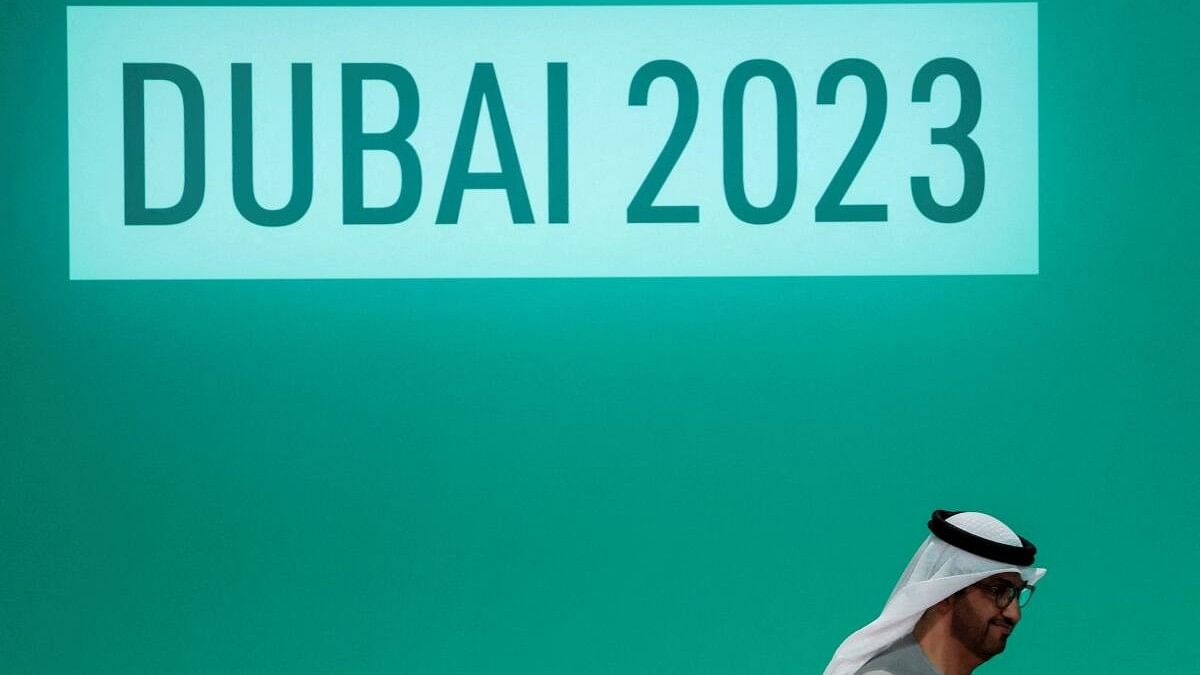
United Arab Emirates Minister of Industry and Advanced Technology and COP28 President Sultan Ahmed Al Jaber walks at a plenary meeting, after a draft of a negotiation deal was released, at the United Nations Climate Change Conference COP28 in Dubai, United Arab Emirates.
Credit: Reuters Photo
Don’t be misled by any headlines celebrating the so-called historic outcomes of COP28. Just because an oil company CEO was the first to insert the ‘F’ words into the three-decade-old climate negotiations does not mean it is the end of the fossil fuel era, and if there were any hopes raised on Day One of COP28 by the announcement of operationalisation of the Loss and Damage Fund, they were quickly shattered by the meagre financial pledges that followed. The current pledges total only $700 million or just 0.2 per cent of the $400 billion needed each year to address the loss and damage.
COP28 can be considered a success only for the 2,456 fossil fuel lobbyists swarming the corridors of the Expo City in Dubai and, of course, the historical polluters led by the United States — the world’s largest oil and gas producer, and wealthiest country — that has weaselled its way out of making any commitments or plans to implement a phaseout of fossil fuels even as they ramp up production of oil and gas. US negotiators in Dubai, meanwhile, were practically forcing every country to agree to such a phaseout.
Sure, this is the first UN climate agreement that ‘calls on all countries to transition away from fossil fuels in energy systems in just, orderly, and equitable manner,’ however, it only singles out ‘unabated coal for accelerated phase down’ and gives a free pass to transitional fuels, oil and gas, the fossil fuels of the developed and rich countries. It really is business as usual, and worse, the outcome allows for dangerous distractions such as untested and unproven carbon capture, utilisation, and storage technologies.
Furthermore, what is worrying for poor, cash-strapped, and most vulnerable countries is the lack of progress on global goal on adaptation, the final text has weak language on targets without timelines and no indication of how adaptation finance will be scaled up. That can has been kicked down the road to the next COP in 2024.
Not everyone is celebrating the outcome; the Marshall Islands said that it came to COP28 ready to collectively work for the good of future generations. Instead, it lamented, “we have built a leaky canoe.” The Holy See also registered its concern about a lack of progress in securing intergenerational justice. Several countries including Antigua and Barbuda were also disappointed in the weak language on human rights. “If this is what a ‘historical outcome’ looks like, then it is on the wrong side of history,” noted Sanjay Vashist, an observer attending his 20th COP. A delegate from the Children and Youth constituency said the agreement had “written her obituary at the age of 16”.
None of this is surprising, in the first week of COP28 the Guardian revealed comments from COP28 president Sultan Al Jaber saying there was “no science” that said a fossil fuel phase out was needed to keep global heating below 1.5C. Al Jaber, also CEO of the UAE’s State oil company, claimed his comments were misinterpreted. Then, earlier this week, the OPEC (Organisation of Petroleum Exporting Countries) sent a letter urging its members and allies to reject any mention of fossil fuels in the final summit deal, warning that "undue and disproportionate pressure against fossil fuels may reach a tipping point". A closer reading of the final agreement text gives observed warming as ‘about 1.1C’, while the actual current global warming level is about 1.3C, which also explains the lack of sense of urgency.
Meanwhile, India did not follow up on its call for phase down of all fossil fuels from COP27, nor did it explicitly endorse the call for fossil fuel phase-out at COP28; instead, India's Environment Minister Bhupender Yadav demanded "equity and justice" in any deal, holding that rich countries should be leading global climate action.
Unfortunately, COP28 threw equity and justice out of the steel and glass windows of the ExPO 2020 venue, giving wealthy countries and countries of the Global South the same targets and timelines, without any means of implementation, additional climate finance and resources to the latter to enable the energy transition.
The only takeaway from COP28 is that it is time to bar the presence of fossil fuel lobbyists, as the COP moves from one oil-producing nation to a city where one of the world’s first oil fields was developed 1,200 years ago, Baku, Azerbaijan in 2024.
(Shailendra Yashwant is a senior adviser to Climate Action Network South Asia (CANSA). X: @shaibaba.)
Disclaimer: The views mentioned above are the author's own. They do not necessarily reflect the views of DH.